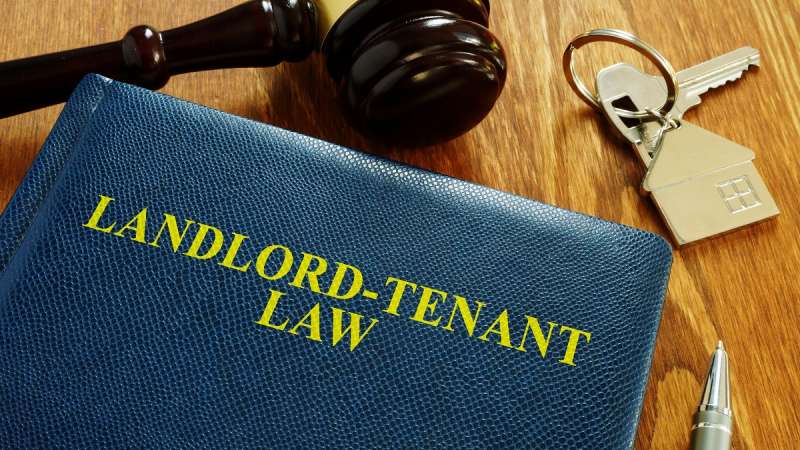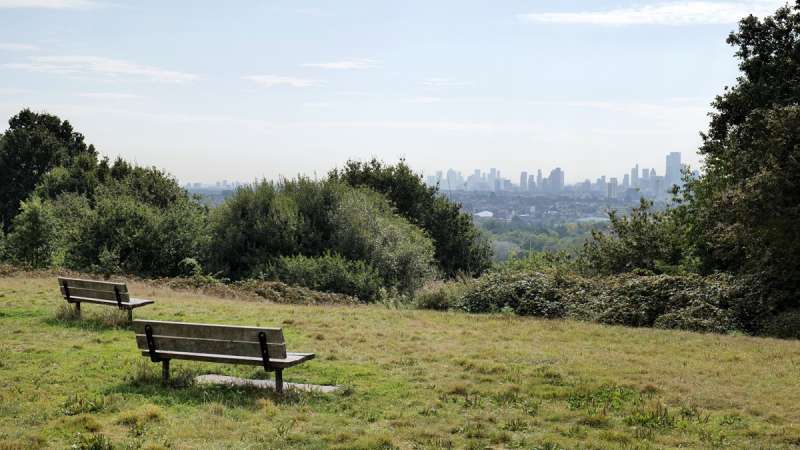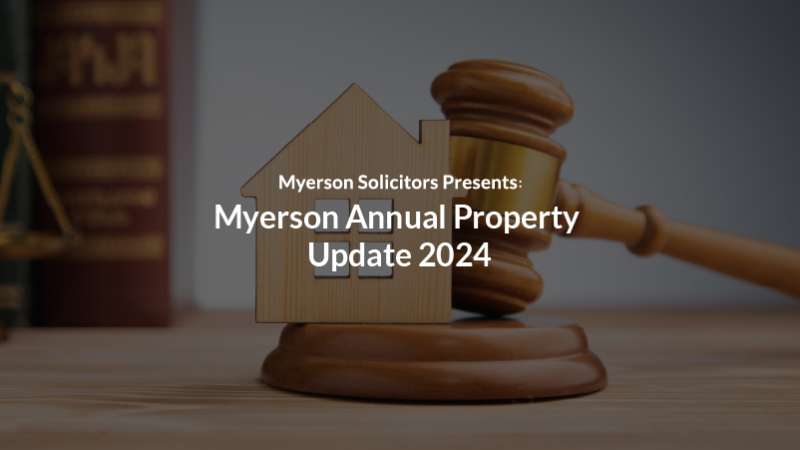Our Easements Disputes Service
Our property litigation lawyers carefully evaluate easement disputes, taking into account the specific circumstances of each case, and provide tailored guidance for your unique situation.
Myerson's property litigation solicitors are experts; we have successfully handled various cases involving common easements and rights of way disputes.
Our team is dedicated to finding the best method of dispute resolution to help you maintain positive relationships with your neighbours (whether those be neighbouring businesses, adjoining neighbours of a development site or neighbours of your residential property) while safeguarding your land access or property rights.
If you have a dispute relating to an easement that you would like to discuss further, please do not hesitate to contact a member of the Property Litigation team.
Easements rights
An easement is the right for one owner to make use of land belonging to someone else in a specific manner or for a specific purpose, even though they do not own the land.
They can be created in a number of different ways.
It's important to note that an easement cannot be established through illegal actions.
Easements are lasting, as they are generally tied to the land and transferred across to a purchaser should the land be sold.
It's crucial to distinguish between private easements, which grant specific rights to a particular group of people, and public easements, which provide rights to the general public.
A private easement could be when one property owner with no direct access to a highway has permission to use a specific path or driveway crossing their neighbour's land to access a public road.
A public easement could be a "right to roam" where the general public is permitted access through private farmlands or fields as part of a designated walking route, with the landowner's permission, provided no damage is caused to the property or land.
Why Work With Our Property Litigation Team
- Our property litigation lawyers have been ranked as a top-tier law firm by the Legal 500 for the last seven years.
- You will have access to more than 30 property experts across the Myerson Property Group, including commercial property, construction, residential property conveyancing and development.
- You will receive city-quality commercial property legal advice at regional prices.
- We provide a partner-led service to ensure you receive the best legal advice and commercially-minded support.
- Our property litigation solicitors compromise a large team which is capable of meeting your deadlines.
- We understand that each transaction is bespoke to your individual circumstances and that you need support from a property lawyer who is experienced in dealing with a wide variety of clients and types of work.
- We are a full-service law firm operating from a one-site office, which means our teams communicate effectively and efficiently.
- We use the latest technology to ensure that we are working as efficiently as possible and that geographical distance is no bar to us from providing excellent client service.
- We were the winners of ‘Property Team of the Year 2021’ at the Manchester Legal Awards.
- We provide free newsletters and webinars to all our clients to keep you up to date with the real estate sector and changes in the law. Watch our latest property update webinar here.
- Take a look at the Myerson Promise for further benefits of working with us here.
Testimonials
Easement FAQs
What is an easement?
An easement is a right over a piece of land or property.
It is a legal permission that enables someone to use someone else's property or land for a particular purpose, even when they do not own the property themselves.
How are easements created?
There are various ways in which a legal easement can be established, such as the following:
- Easement by express grant – The easement may be documented through a Deed of Grant specifying the terms of the easement. Alternatively, the grant could be included as a clause in a conveyance deed or a transfer deed.
- Easement by necessity – An easement by necessity is often seen in cases where a landowner cannot access their land without crossing neighbouring land.
- Easement by prescription – To establish this type of easement, otherwise known as a "prescriptive" easement, a person must openly and consistently use the land in a way that could be considered an easement without using force, keeping it secret, or obtaining permission, and they must do so continuously for a statutory period of at least twenty years.
Easements can include rights of way, rights to light, utility and drainage easements, and parking easements.
Easement disputes can arise due to disagreements between property owners regarding the scope, extent, or terms of the easement, unauthorised alterations or obstructions, changes in land use, or disputes over the continued need for the easement.
Our property litigation team have extensive experience assisting with easement disputes.
Seek legal advice from Myerson Solicitors if you need professional counsel.
What is a right of way?
A "right of way," is a type of easement. It is the right for one owner to cross over someone else's land.
Without a landowner's permission or a formal agreement, going onto someone else's property would generally be considered trespassing, which is against the law.
What is a right to light?
Another common type of easement is the "right to light."
This means property owners have the legal right to receive natural sunlight through their windows without anything blocking it.
A "right to light" helps make sure homes and buildings have a minimum level of light through their windows.
Can an easement be challenged?
An easement can be challenged in certain situations.
Common reasons for challenging an easement include disputing its validity, claiming that it has been abandoned or no longer serves a purpose, or arguing that the terms of the easement are being violated (for example, if the use of the easement exceeds the scope of its grant).
Challenging an easement typically involves legal proceedings, and the outcome depends on various factors, including the specific circumstances and applicable laws.
It's advisable to consult with a legal professional, such as a member of Myerson Solicitors' Property Litigation team, if you are considering challenging an easement or if you believe your rights related to an easement are being violated.
What happens if you breach an easement?
If you breach an easement, you may face legal action, such as a lawsuit by the easement holder seeking to enforce their rights, remove any obstructions, or claim damages resulting from the breach.
If you have breached an easement, you may want to seek legal advice.
Can a neighbour block your right of way?
Usually, a neighbour cannot block your legal right of way. If you have a legal right to use a part of their land, obstructing it could violate your rights.
However, this can vary by location and can also depend on the terms of the deed of easement (if there is one), so it's a good idea to consult with Myerson Solicitors if you face this issue.
What happens if somebody interferes with my right of way?
To pursue a claim of interference, the affected party must demonstrate their entitlement to the easement, specify its nature, and establish that the interference is significant.
Not every minor infringement on your right of way will result in a need for legal action.
For the infringement to be actionable, the interference must be substantial enough to affect your use of the right of way in a noticeable and inconvenient manner.
A trivial impact will not give rise to a claim.
The remedies available if there is an interference include:
- A declaration from the Court confirming the easement and defining the extent of it.
- The easement holder can request a court-issued injunction to stop the interference or prevent further violations of the easement.
- If the interference has resulted in financial losses, the easement holder may seek compensation for the damages suffered.
- In many cases, parties involved in an easement dispute may choose to resolve the matter through negotiation or mediation.
When facing right of way disputes it is important to avoid conflict with your neighbour or members of the public.
You should seek an expert property disputes solicitor straight away who can help resolve the situation.
Can I put a gate across a right of way?
Putting a gate across a right of way doesn't necessarily amount to interference, but you would need to assess whether putting that gate in place would substantially interfere with the right of way.
For example, whilst one gate might not be a substantial interference, several gates over a short route would be.
What is the 20-year rule for right of way?
As mentioned above, if a claimant can provide evidence that one land owner has used a right of way (for example) without force, secrecy, or permission for a continuous period of twenty years, they may be able to argue that they benefit from a prescriptive easement.
Contact Our Property Litigation Solicitors
If you need any legal advice concerning rights of way or easements, please contact our expert property litigation lawyers:
01619414000
Our Property Litigation Team
Home-grown or recruited from national, regional or City firms. Our property litigation lawyers are experts in their fields and respected by their peers.







